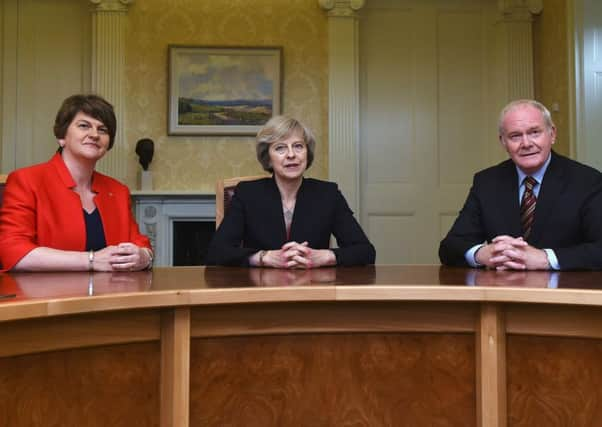Leaders: Hard borders are a fact of life for those outside EU


Theresa May was at pains to point out that she did not want to see a “hard border” with the Irish Republic when she visited Northern Ireland on her first visit to the province as Prime Minister.
Her words conjure up the stark image of the Troubles in the not so distant past when Northern Ireland’s police and British Army soldiers manned large swathes of the border in an attempt to keep paramilitaries from crossing.
Advertisement
Hide AdAdvertisement
Hide AdReinstating the “hard” border, due to the Brexit result, would be a massive economic and psychological blow for many living on either side of it.
The Taoiseach, Enda Kenny, stated his position very clearly last week when he said that he did not want to go back to the “days of checkpoints, towers and customs and all of that. That would be very retrograde step.” So the Irish prime minister’s desires are very close to Mrs May’s. However, what is not clear is just how their wishes might come about.
Mrs May pointed to the common travel area, set up in 1923, decades before Ireland and the UK became members of the European Union, which established free movement across Ireland, Britain and Northern Ireland with minimal officialdom.
But as optimistic as this sounds the fundamental problem with this is that Northern Ireland will soon no longer be a member of the EU, while Ireland remains part of it.
At the heart of the fierce Brexit debate was the free movement of people and the resulting Leave vote was the electorate clearly stating that their settled will is to have some control over immigration. This can only mean that, if the UK is to have any control over immigration, it needs to have the wherewithal to stop people entering at its borders – and that would have to include between the Republic of Ireland and Northern Ireland.
And all the indications from Europe so far are if the UK, or any part of it, wants to have access to the single market there will have to be some concessions on freedom of movement for workers.
This discussion is extremely pertinent to Scotland. Nicola Sturgeon is exploring every option to allow Scotland to remain in the EU. The First Minister has made a point of stating that Scotland was reliant on freedom of movement to grow the population and fill in skills gaps.
She also highlighted the importance of the single market to Scotland. The First Minister is trying to see if it is possible for Scotland to remain in the single market and is happy to allow freedom of movement, either as part of the UK with a special deal or, presumably if that is not possible then as an independent member of the EU.
Advertisement
Hide AdAdvertisement
Hide AdBut in either of these scenarios, if England is to maintain the ability to control who crosses its borders from a Scotland that has open borders with the rest of Europe, then there will have to be border checks.
To solve the conundrum of keeping borders open, the First Minister yesterday said if they could solve it in Ireland then it could be solved here. They haven’t solved it in Ireland.
Festivals worth their weight in gold
As posters advertising a spectacular variety of Edinburgh Fringe and International Festival shows appear as if by magic along Princes Street, some citizens might be tempted to moan about the hoards of visitors and “luvvies” about to descend on the capital city.
But they should stop and ponder the vast sums of money generated for Scotland’s economy by these two major festivals and all the others held over the year.
The sum of £313 million for 2015, up almost a quarter from five years ago, is a much-needed cash injection and has helped provide thousands of jobs.
There can be no doubt that pulling in the crowds for a range of amazing festivals, from the red carpet frenzy of the Edinburgh International Film Festival to the Military Tattoo on the Castle Esplanade, and the Hogmanay events broadcast to global audiences, is something which our festival gurus have honed almost to perfection.
The second Thundering Hooves report, a “report card” for festivals, was published a year ago, and it warned that organisers must not get lazy or rest on their laurels, because other cities around the world want a piece of the action and are fast catching up.
But no-one in the arts world, constantly fighting budget cuts, is complacent and all have done well to maintain their lead.
Advertisement
Hide AdAdvertisement
Hide AdWith the pound going down, it should be cheaper for foreign visitors to visit Scotland and enjoy all the fun of the festivals. There could be an unexpected Brexit boost.
Not only does this mean more customers for hotels and B&Bs, and trade for restaurants and shops, it also makes sure we maintain an important link with our fellow Europeans.